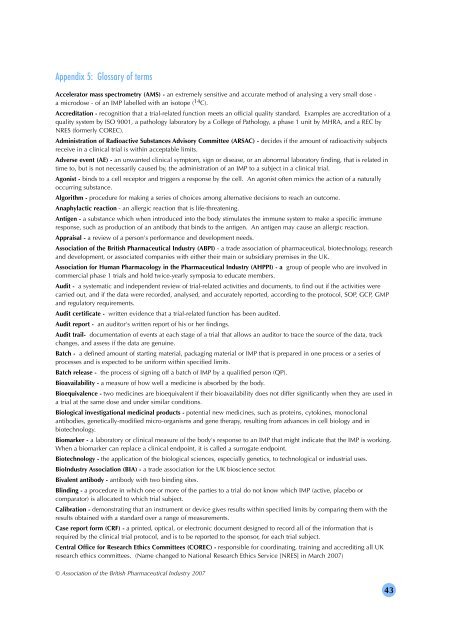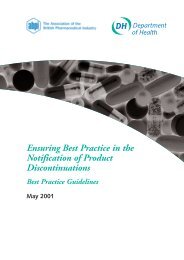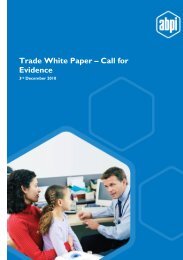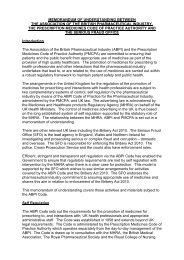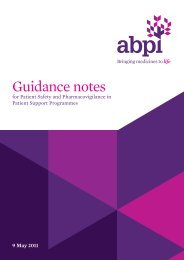ABPI Guidelines for Phase 1 Clinical Trials (PDF
ABPI Guidelines for Phase 1 Clinical Trials (PDF
ABPI Guidelines for Phase 1 Clinical Trials (PDF
You also want an ePaper? Increase the reach of your titles
YUMPU automatically turns print PDFs into web optimized ePapers that Google loves.
Appendix 5: Glossary of terms<br />
Accelerator mass spectrometry (AMS) - an extremely sensitive and accurate method of analysing a very small dose -<br />
a microdose - of an IMP labelled with an isotope ( 14 C).<br />
Accreditation - recognition that a trial-related function meets an official quality standard. Examples are accreditation of a<br />
quality system by ISO 9001, a pathology laboratory by a College of Pathology, a phase 1 unit by MHRA, and a REC by<br />
NRES (<strong>for</strong>merly COREC).<br />
Administration of Radioactive Substances Advisory Committee (ARSAC) - decides if the amount of radioactivity subjects<br />
receive in a clinical trial is within acceptable limits.<br />
Adverse event (AE) - an unwanted clinical symptom, sign or disease, or an abnormal laboratory finding, that is related in<br />
time to, but is not necessarily caused by, the administration of an IMP to a subject in a clinical trial.<br />
Agonist - binds to a cell receptor and triggers a response by the cell. An agonist often mimics the action of a naturally<br />
occurring substance.<br />
Algorithm - procedure <strong>for</strong> making a series of choices among alternative decisions to reach an outcome.<br />
Anaphylactic reaction - an allergic reaction that is life-threatening.<br />
Antigen - a substance which when introduced into the body stimulates the immune system to make a specific immune<br />
response, such as production of an antibody that binds to the antigen. An antigen may cause an allergic reaction.<br />
Appraisal - a review of a person's per<strong>for</strong>mance and development needs.<br />
Association of the British Pharmaceutical Industry (<strong>ABPI</strong>) - a trade association of pharmaceutical, biotechnology, research<br />
and development, or associated companies with either their main or subsidiary premises in the UK.<br />
Association <strong>for</strong> Human Pharmacology in the Pharmaceutical Industry (AHPPI) - a group of people who are involved in<br />
commercial phase 1 trials and hold twice-yearly symposia to educate members.<br />
Audit - a systematic and independent review of trial-related activities and documents, to find out if the activities were<br />
carried out, and if the data were recorded, analysed, and accurately reported, according to the protocol, SOP, GCP, GMP<br />
and regulatory requirements.<br />
Audit certificate - written evidence that a trial-related function has been audited.<br />
Audit report - an auditor's written report of his or her findings.<br />
Audit trail - documentation of events at each stage of a trial that allows an auditor to trace the source of the data, track<br />
changes, and assess if the data are genuine.<br />
Batch - a defined amount of starting material, packaging material or IMP that is prepared in one process or a series of<br />
processes and is expected to be uni<strong>for</strong>m within specified limits.<br />
Batch release - the process of signing off a batch of IMP by a qualified person (QP).<br />
Bioavailability - a measure of how well a medicine is absorbed by the body.<br />
Bioequivalence - two medicines are bioequivalent if their bioavailability does not differ significantly when they are used in<br />
a trial at the same dose and under similar conditions.<br />
Biological investigational medicinal products - potential new medicines, such as proteins, cytokines, monoclonal<br />
antibodies, genetically-modified micro-organisms and gene therapy, resulting from advances in cell biology and in<br />
biotechnology.<br />
Biomarker - a laboratory or clinical measure of the body's response to an IMP that might indicate that the IMP is working.<br />
When a biomarker can replace a clinical endpoint, it is called a surrogate endpoint.<br />
Biotechnology - the application of the biological sciences, especially genetics, to technological or industrial uses.<br />
BioIndustry Association (BIA) - a trade association <strong>for</strong> the UK bioscience sector.<br />
Bivalent antibody - antibody with two binding sites.<br />
Blinding - a procedure in which one or more of the parties to a trial do not know which IMP (active, placebo or<br />
comparator) is allocated to which trial subject.<br />
Calibration - demonstrating that an instrument or device gives results within specified limits by comparing them with the<br />
results obtained with a standard over a range of measurements.<br />
Case report <strong>for</strong>m (CRF) - a printed, optical, or electronic document designed to record all of the in<strong>for</strong>mation that is<br />
required by the clinical trial protocol, and is to be reported to the sponsor, <strong>for</strong> each trial subject.<br />
Central Office <strong>for</strong> Research Ethics Committees (COREC) - responsible <strong>for</strong> coordinating, training and accrediting all UK<br />
research ethics committees. (Name changed to National Research Ethics Service [NRES] in March 2007)<br />
© Association of the British Pharmaceutical Industry 2007<br />
43


